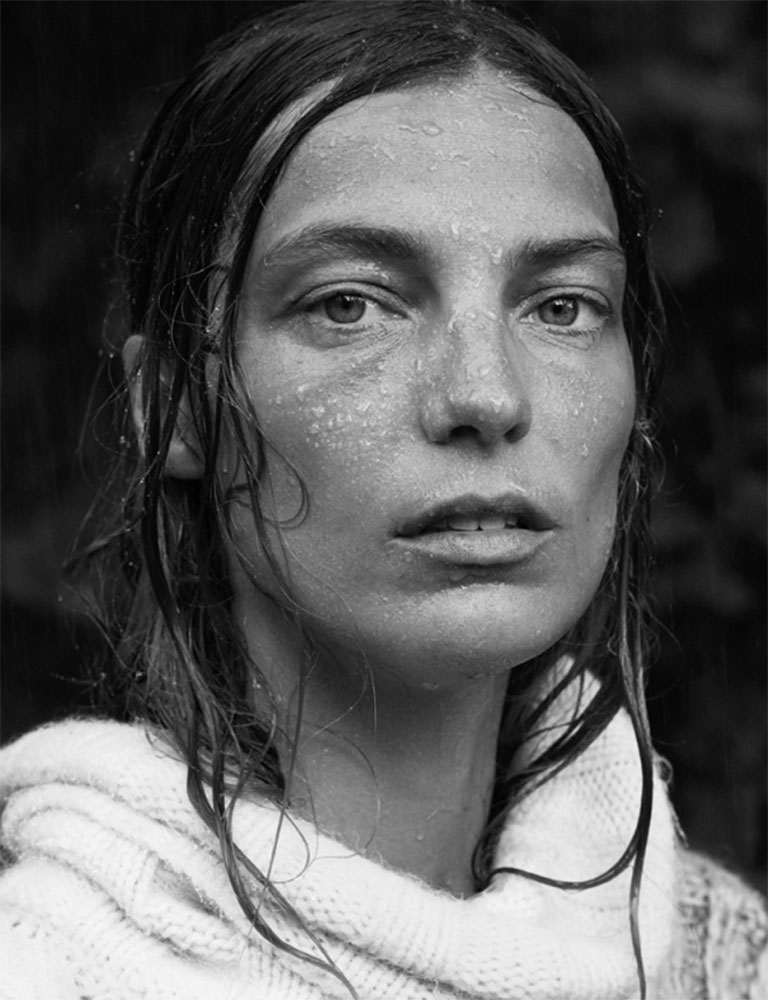
Daria Werbowy photographed by Mikael Jansson for Interview Magazine, 2014
By Katie May Ruscoe
Menopause, the New Yorker recently announced, is "having a moment".
Once considered the last taboo of health subjects – at various historical points evoking witch hysteria, getting played for laughs or straight up avoided as a topic – conversations around ‘the change’ have, in recent years, been liberated from the private realm and are now being explored frankly and often radically across social media feeds, podcasts, celebrity books, iconic TV monologues and film (see: the extremely menopause coded The Substance). And we love to see it.
In this spirit of reclamation, let's chat about what this season of life – delightfully referred to in traditional Chinese medicine as ‘the second spring’– means for hair.
In Aotearoa the average age of menopause (referring here to the cessation of the menstrual cycle aka the end of the reproductive years) is 51.5, however, as we’re now all better understanding, this is far from a quick or linear transition.
Perimenopause, the phase leading up to menopause, can begin a good decade prior, bringing with it an ever-shifting tide of hormonal fluctuations and associated physical changes. While hot flashes, irregular periods and mood changes are well-trodden symptoms, hair changes often take women by surprise.
As estrogen levels rise and fall, hair health and appearance can shift with it, calling for a responsive and self-compassionate approach to haircare routines.
Colleen director Lauren Gunn sees these changes first hand daily in the salon, and helpfully lends her expertise on the ‘big three’ concerns (we’ll take a closer look at greying next month).
Thinning and shedding
Find yourself increasingly scrutinising those strands on the shower tiles? You’re not alone.
A reduction in hair volume, particularly at the crown and temples, is a really common concern, with a 2022 study in the journal Menopause finding that over half of the nearly 200 postmenopausal women studied had experienced female pattern hair loss.
Dips in estrogen during perimenopause can slow down the hair’s growth phase by up to 30%, while also ramping up shedding. Meanwhile, an increase in androgens can shrink hair follicles, meaning that the hair growing in can be finer than it used to be. A RUDE triple whammy.
Lauren first of all recommends taking a ‘from the inside, out’ approach to strengthening and supporting hair – she's a big fan of the Hairology capsules from Vida Glow. “It’s the best daily multivitamin I have ever come across to boost hair growth, the ingredients are epic.”
For a more intensive approach, Minoxidil treatments are a proven daily topical lotion that reboots dormant follicles and increases the size of each strand of hair. Lauren points out that this is a pharmacy-only product, and that the treatments can affect hair colouring results.
And for everyday care? Keep it moving! “Lots of women become scared to brush their hair (and scalp) but it is really important during periods of hair loss as it increases circulation to the follicle and improves scalp condition. My fave is the Epic Wet Brush,” she says.
“Again for circulation, putting your head upside-down either over the edge of the bed, or sitting on a stool, is a great way to get blood flowing to the follicles too. Intense bursts of cardio can also have a similar effect.”
Dryness and brittleness
Remember the absolute greasy state of your hair during puberty? Menopause is kinda the inverse of that – estrogen is responsible for sebum production, and as it starts to decline so too can the hydration of your scalp and hair stands, often leading to hair becoming more coarse, brittle, and prone to breakage.
“Using a nourishing serum can reverse the brittleness by mimicking the effects of lipids on the hair shaft, promoting soft and supple strands,” says Lauren.
“The Kevin Murphy Young Again range is the most effective I have found as the results are cumulative over time with regular use. Alternating or replacing your shampoo with a co-wash can also help to keep strands soft and nourished.”
Wanting an extra hydration boost? “In the salon we have a Hyaluronic Acid treatment that boosts elasticity and reduces frizz – it lasts in the hair for 3-6 months, making it more manageable.”
Scalp sensitivity
Say it with us again: Scalp health is hair health, and during the transition to menopause this area needs extra love and attention.
The aforementioned reduction in sebum can affect the skin barrier, opening microscopic cracks into which irritants can weasel their way – leading to inflammation.
Lauren recommends a nourishing overnight treatment to de-stress the scalp, as well as products which focus on balancing and calming. And again, don’t be afraid to brush, brush, brush.












